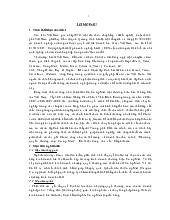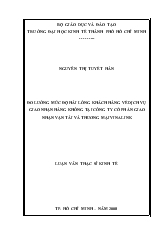Effects of Disruptive Events on Consumer Loyalty: Bank Switching After 2008’s Crisis
- Người chia sẻ :
- Số trang : 11 trang
- Lượt xem : 8
- Lượt tải : 500
- Tất cả luận văn được sưu tầm từ nhiều nguồn, chúng tôi không chịu trách nhiệm bản quyền nếu bạn sử dụng vào mục đích thương mại
Bạn đang xem trước 20 trang tài liệu Effects of Disruptive Events on Consumer Loyalty: Bank Switching After 2008’s Crisis, để xem tài liệu hoàn chỉnh bạn click vào nút DOWNLOAD LUẬN VĂN ở trên
Historically, consumers named convenience as their top reason for choosing a bank. Several studies found that this factor has been pushed to third place behind financial stability (65 %) and trust (54 %) after 2008’s financial crisis (Krohn 2009). Implications of this change in consumer behavior need to be analyzed in a sophisticated way: Only few European consumers participated in the “big game” gambled by the bank service industry. In Europe, only every tenth person holds stocks or is engaged in the financial marketplace with high hazard investments. From this point of view, experienced personal losses cannot be as much the determining factor for lost trust in the bank industry as an overall perceived concernment about the financial crisis. Our in-depth interviews show that consumers have an ambivalent view on the financial crisis. On the one hand, the financial crisis did not affect them directly and they quite often do not associate the financial crisis with their own financial service provider. On the other hand, they associate negative metaphors like “dragons” and “snakes” with the financial crisis, interpreting this disruptive event as harassment and having caused bad feelings toward the banking system. The financial crisis thus elevated the consumers’ sensibility to bank managers’ practices and damaged the image of bank service industries in general. As a consequence, consumers’ intention to switch their bank proves to be related with the concern about the financial crisis.




